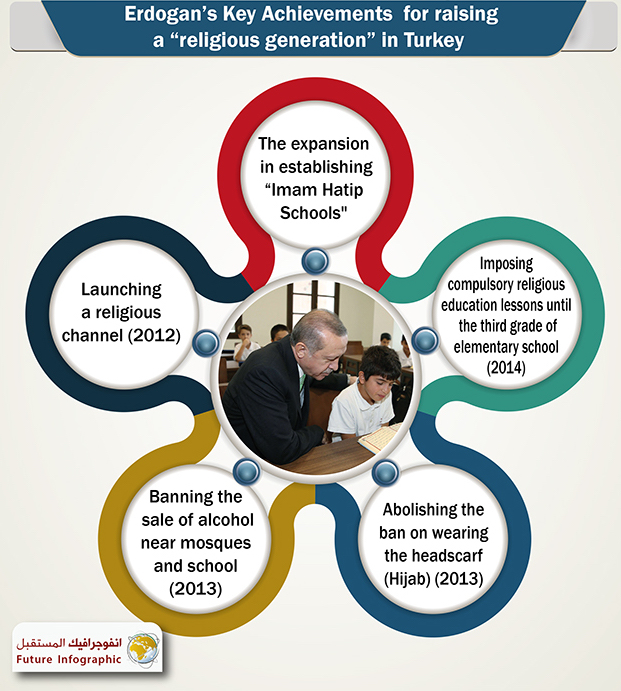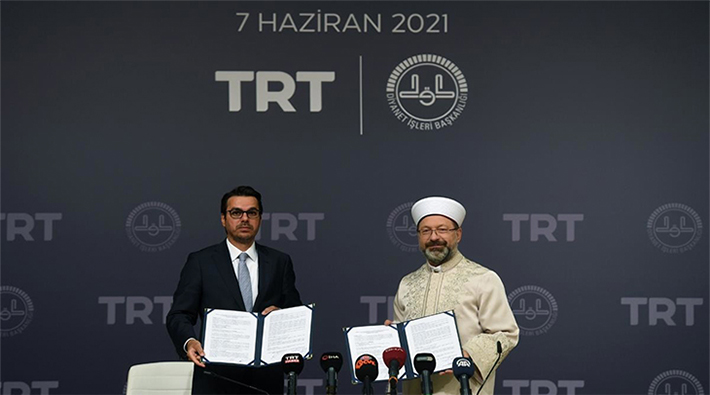On June 7, 2021, Ali Erbaş, President of Directorate of Religious Affairs in Turkey, and İbrahim Ärän, Director of the Turkish Radio and Television Corporation (TRT), signed a cooperation protocol to establish a religious channel for children, which would be the first of its kind in Turkey. Within this context, Erbaş, said, "We have not been able to present Islamic values to children over the past years, since we used to show them animated cartoons designed by foreign companies." [1]He emphasized the need to exert efforts to sustain children with correct religious knowledge.
The government’s establishment of a religious channel for children has raised questions regarding the dimensions and motives of this step currently, particularly since there is a Turkish tendency to politicize and use religion to serve the political and electoral motives of President Recep Tayyip Erdoğan.
Fostering a ‘religious generation’
Establishing a religious channel for children in Turkey falls under the framework of Erdoğan's project, which aims at raising a committed, religious generation that believes in the Ottoman culture and is able to overcome Western secular concepts. In confronting the secular principles on which the modern Turkish Republic was founded by Mustafa Kemal Ataturk in 1923 after abolishing the Ottoman Caliphate, Erdoğan and his ruling Justice and Development party (AKP) seek to eliminate Ataturk’s secular legacy, establish a new republic that is based on the principles of political Islam, and to restore what AKP supporters describe as the ‘glory of the Ottoman Caliphate’.
Ataturk believed that Turkey is a secular state, which belongs to the Western world, and that its development and modernization require adopting of a Western secular model and setting religion aside from public life, as well as adding an article in the Turkish constitution confirming the secularism of the state. On the other hand, Erdogan believes that Turkey has historical and religious connections with the Arab and Islamic worlds, He affirms that Turkey is an extension of the Ottoman Empire, and that no problem can be solved and no services can be provided without setting Islam at the core of their lives. In April 2016, Ismail Kahraman, Former Speaker of the Turkish Parliament and a member of the AKP, called for taking secularism out of the constitution and establishing a religious constitution, considering Turkey a Muslim country.
Erdogan seeks to achieve his objective of raising a ‘religious generation’ and expanding the presence of religion in public life, by combining two known methods in the literature of political Islam: The first is ‘top-down change”’ by revising existing secular laws and imposing Islamic ones. The second method is ‘bottom-up change’ by instilling Islamic concepts in the younger generations through education, advertising and various societal activities.
The combination of both methods has emerged in the measures adopted by the AKP since it came to power in 2002, as follows:
1. Expanding the establishment of Islamic government schools, ‘Imam Hatip Schools’, where religious sciences are taught in addition to other subjects. Erdogan and the majority of AKP members have previously studied in these schools. The number of these schools increased from 450 schools in 2002 to about 5,138 schools in 2020, whether through the construction of new schools or the transformation of some regular state schools into ‘İmam Hatip Schools’. In 2012, a law was passed permitting children from the age of 10 to enroll in public religious schools.
The government indirectly forces citizens to enroll in these schools due to the inability of regular government schools to accommodate large numbers of students. This gave rise to the objection of a large number of citizens, who refuse to put their children in religious schools, especially since there is no other alternative but expensive private schools. The Turkish Ministry of Education responded to the citizens' complaints by saying that no one is forced, and that those who do not want to enroll their children in İmam Hatip Schools can go for private schools, after public schools have been filled. This policy has led to an increase in the number of students in Imam Hatip Schools from 71 thousand students in 2004 to 1.3 million students in 2020.
2. The Education Shura Council’s approval in 2014 of compulsory religious education lessons until the third grade of elementary school, and the inclusion of the Ottoman Turkish language as a mandatory subject in the school curricula, while teaching Darwin’s theory of evolution, which is viewed by many as inconsistent with Islam, was canceled in 2017, since it perceived as controversial.
3. The gradual step which started in 2012 to abolishing the ban on wearing the headscarf (Hijab) for female students, parliamentarians and lawyers, leading to the lifting of the ban completely in state institutions in 2013.
4. Imposing rigorous laws on the sale of alcohol and tobacco, where the Turkish government has prohibited the sale of alcohol, especially near mosques and schools, since 2013. It has also imposed high taxes on alcoholic beverages and banned any advertisements or posters promoting alcohol.
5. Establishing a religious channel in 2012, in cooperation between the Directorate of Religious Affairs and the Turkish Radio and Television Corporation, under the name ‘Diyanet’.

Pleasing Voters
The establishment of a religious channel for children in Turkey comes within a series of measures recently adopted by President Erdoğan in an attempt to please his religious and conservative electoral base, in preparation for the 2023 elections, after several opinion polls reflected a decline in the popularity of AKP due to Turkey's deteriorating economic conditions. One of these measures taken by Erdogan is the conversion of the Hagia Sophia Museum, which was originally a church, into a mosque and permitting prayers in it. Many Turkish supporters of secularism view the conversion of Hagia Sophia into a mosque as a direct attack on the legacy of Ataturk, who turned it into a museum in 1934, gifting it to humanity.
In March 2021, President Erdoğan also withdrew Turkey from the Council of Europe Convention on preventing and combating violence against women and domestic violence, or the so-called ‘Istanbul Convention’. This was a demand made by Turkish religious conservatives, who believe that the agreement harms the traditional values of Turkish families, threatens the family unity and encourages divorce. It believed to be used by homosexuals to obtain wider acceptance in society, as the convention includes a reference to non-discrimination on the basis of sexual orientation.
Erdoğan is also expanding in the construction of mosques in Turkey. According to 2020 data from the Directorate of Religious Affairs, Turkey has constructed 13,000 mosques since Erdoğan took power. In May 2021, Erdoğan inaugurated the first mosque in the famous Taksim Square in Istanbul, a goal that Erdoğan had been striving to achieve since he was mayor of Istanbul in the 1990s. Back then, he deplored the fact that there was no mosque in Taksim Square, and that the only visible religious site was an Orthodox church. Some accused Erdoğan of seeking to ‘Islamize Turkey’ and to overshadow Kemal Ataturk, the founder of the republic, as the mosque now dominates Ataturk's Republic Monument. In May 2019, Erdoğan inaugurated Turkey's largest mosque, Çamlıca Mosque, which is modeled on classical Ottoman designs.
In conclusion, establishing the first religious channel for children in Turkey arguably comes among a series of measures adopted by President Erdoğan's regime at all levels to establish a ‘religious generation’, which believes in the Ottoman Caliphate and embraces the ideology of political Islam. This comes within the framework of establishing a new republic that is completely different from Ataturk’s secular republic. A foundational step taken by Erdoğan is canceling the parliamentary system that has prevailed since the establishment of the modern Turkish state in 1923, and adopting the presidential system, where he possesses the sole executive authority in the country. This prompted his opponents to call him the ‘The Awaited Caliph’.
[1] https://www.al-monitor.com/originals/2021/06/turkeys-religious-agency-plans-launch-childrens-tv-channel


